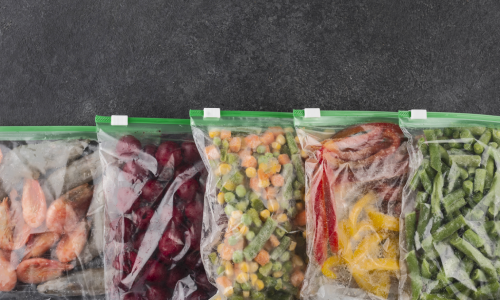Did you know that India is grappling with a silent epidemic of lifestyle diseases? According to recent studies, approximately one-third of the adult population in India is living with high blood pressure. In 2019, it was estimated that 77 million people in India had diabetes. This number is predicted to increase to more than 134 million by 2045. That’s a staggering figure, isn’t it? Dietary habits – including processed and frozen foods – are increasingly recognized as contributing factors to this health crisis. In today’s fast-paced world, convenience often trumps nutrition, and frozen foods have become a mainstay in many households. From frozen pizzas and ready-to-eat frozen foods to pre-packaged snacks, the allure of quick and easy meals is undeniable. But what impact do these frozen food products have on our health, particularly from the perspective of Ayurveda? Today, I will talk more about what Ayurveda says about frozen foods and all about healthy Ayurvedic foods! What are Frozen foods? With cold storage and preservation technology enhancements, frozen foods have become a multi trillion-dollar business. They are handy, last longer, and save time if you don’t want to cook. Nowadays, children are hooked on frozen food items. Adults, like children, take the easy way out. Frozen meats, such as salami, sausages and kebabs are purchased at the market and consumed after heating. You can also buy frozen dinners, including gourmet dishes that might take longer to prepare or involve hard-to-find ingredients, so it’s a win-win situation. But is it? While frozen meals are handy and seamless, you’ll be compromising your health in return. And that’s the opposite of what Ayurveda is all about. Ayurveda sees food not just as a source of satiating your hunger, but also as medicine. The system of medicine believes food has the power to heal. And that’s why Ayurveda always suggests having warm, freshly cooked nutritious or Sattvic foods. Is It Okay to Eat Frozen Foods? Refrigeration affects much more than simply the flavour, texture, and colour of food. According to studies, the blanching technique used to pack fruits and vegetables depletes them of vitamins B and C. Frozen meals have fewer antioxidants than fresh vegetables. The biggest worry is the prevalence of high salt levels in frozen meals. It’s suggested that your daily salt intake should not exceed 2300 mg. However, a frozen spaghetti meal has 600 mg of sodium, and meat can include more than 800 mg. Some frozen food manufacturers ensure that the nutritional value of their fruits and vegetables is not compromised since they are frozen when they are at their ripest—when the nutritional content is maximum. So, while newly harvested raw vegetables or fruits are still edible after a few days in the freezer, freezing leftover food or pre-cooked meals is not recommended. “Prana” in Frozen Foods Fresh fruits, vegetables and juices are rich in Prana. They are Sattvic Ayurvedic foods, light, kind on the digestive tract, and do not produce Ama or toxins. However, frozen meals are termed Paryushita (lifeless) in Ayurveda. They have very little Prana, their energy or Ojus has been depleted, and they have lost their Sattvic character throughout the chilling process. They also reduce our digestive fire and stress our digestive system, leading to diseases. If eating frozen meals offers benefits, there are also downsides. It has the potential to have unanticipated consequences for your health. From heart disease to cancer, frozen foods may influence your life. Whether it’s a salad or a burger, eating frozen foods should not become a habit. Ayurveda’s Take on Frozen Foods Most fruits and vegetables are now available all year thanks to refrigeration. However, eating all fruits all year is not optimal. Some fruits, berries and plants grow at particular times of year. It is critical to keep them in fresh batches on the kitchen table. Since this produce is robust in Prana and combined with nature, it can be ideal for balancing the Doshas that are inflamed during the season. For example, as Vata imbalances develop in the fall and autumn, we can ground ourselves by eating unctuous and warm meals. It’s an excellent time to consume more soups, broths and warm, wet meals with the season when nature provides an abundance of high-quality vegetables such as beets, broccoli, brussels sprouts, squashes and gourds. As Kapha season arrives at the height of winter, it is time to transition from a dry and pungent smell. Have warm meals and savour sprouts and berries—the season’s first harvest. Melons, juices, cucumber, mint and other cooling foods are best enjoyed during the summer when Pitta is at its peak. How Frozen Foods Can Aggravate Vata Dosha? Do you find it more challenging to get out of your seat and accomplish anything after eating a frozen or store-bought dinner the day before? If your answer is yes, It’s due to an increase in Vata Dosha. Vata Dosha’s nature is chilly, dry and light. These characteristics are exacerbated when out of balance, as they are during specific seasons such as the fall and autumn. As a result, the air is drier, the skin and hair are dry, the lips are chapped, and muscular and joint discomfort is increasing, among other symptoms of vitiation. Frozen meals might disrupt your digestive and metabolic health by worsening the Vata Dosha. It may induce bloating, constipation, indigestion, dehydration and weight loss. It also causes restlessness and a sense of not being grounded in the mind. What to Eat Instead? According to Ayurveda, we are what we eat, and everything we consume affects our mental state, emotions, productivity, outlook on life and overall well-being. It also indicates that the amount of food we consume, the way of cooking, its odour, look and freshness can impact our mind, digestive system and all five senses. It has most likely been your… Continue reading Frozen Foods – How Ayurveda Views Preservation and Quality
Frozen Foods – How Ayurveda Views Preservation and Quality

